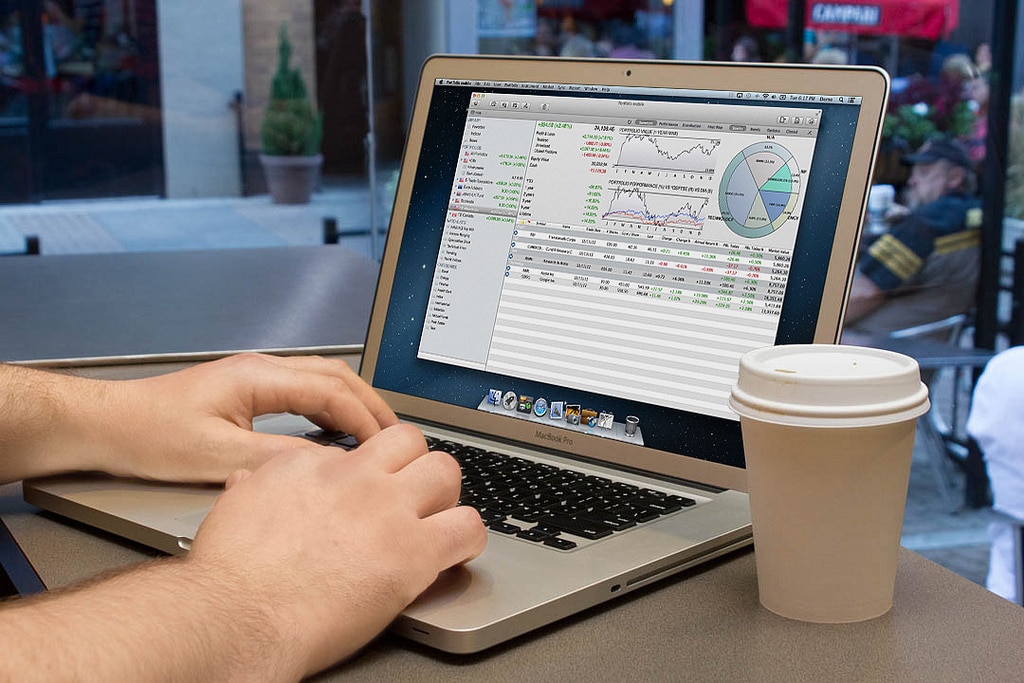Jasmine Birtles
Your money-making expert. Financial journalist, TV and radio personality.


Taking advantage of short-term swings in the stock market to earn a quick profit. Sounds simple doesn’t it? Yet in reality, day trading is a very tricky art to master.
In this article we’re going to explore the ins and outs of day trading, plus we’ll also take a look at some of the risks of buying and selling stocks in quick succession.
Keep on reading for all the details, or click on a heading to jump straight to a section…
Day trading is where investors buy and sell stocks over a short period of time. The goal of day trading is to benefit from the typical ups and downs of the stock market by buying stock when it falls, and selling if and when the price goes up.
Company reports, news stories, market speculation and hearsay, are often the types of sources relied upon by day traders. That’s because day traders will often put their faith in lose signals to make quick investing decisions with the aim of ‘beating the market’.
Strictly speaking, ‘day trading’ can be used to refer to the act of buying and selling investments on the same day. Despite this, the term can also be used to refer to any form of investing whereby an investor buys a stock with the sole intention of selling it as soon as its value rises above a specific point.
For example, you’d probably get away with calling yourself a day trader if you bought a stock on a Monday, and then sold it later in the week.
It almost goes without saying but day trading isn’t for everyone. Investors who buy and sell the same stock in a short period of time must have their fingers on the pulse at all times. They must also be willing to risk their capital based on a ‘hunch’, and be prepared to take any losses with a pinch of salt.
In contrast, traditional investing is often associated with a ‘buy and hold’ strategy – the complete opposite of day trading.
When investors buy stock with the intention of holding onto it, the aim is to essentially benefit from the rising value of their holdings over a long period of time. In other words, as a business grows and becomes more profitable, ‘buy and hold’ shareholders will hope to enjoy a share of the spoils in the form of a higher stock price, or dividend payments.
On the other side of the coin, making a profit by day trading relies on short-term market swings. This means that in order to be a successful day trader, you must beat other players in the market. To put it another way, for every ‘win’ another investor – or investors – must suffer a loss.
This is why day trading is effectively a zero-sum game, whereas traditional investing – or passive investing – usually isn’t.

While day trading is exceedingly difficult to master (scroll down for the risks below), it is possible to make money from it.
Here are three things you need to know if you’ve an eye on becoming a successful day trader…
There are a huge number of investing platforms to choose from, and it’s worth knowing that fee structures between platforms can vary considerably from one another.
For example, some investment platforms will charge a low platform fee (an ongoing charge for hosting your investments) but will then make their money by upping the cost of share dealing fees (a charge applied to every trade). Other platforms might change a a high platform fee, but a low share dealing fee. Some platforms may even offer 0% commission trades.
And, as you’d expect in a competitive marketplace, some platforms will position themselves in the middle of the road.
So, the point here is that due to the different fee structures between investment platforms, the cheapest platform for one investor might not be the cheapest platform for the next investor.
If you’re looking to day trade, then you’ll probably want to go with an investing platform that offers a low share dealing fee. That’s because any ongoing platform charge is likely to be less of a concern for your investing style.
For more on this, take a look at the article that explains share dealing fees vs platform fees.
When it comes to day trading – or any type of active investing, in fact – it’s paramount that you do your own research. From analysing annual reports, keeping on top of relevant current affairs, to spotting new trends, anything that you can do to give you that extra edge in the market is probably going to be worthwhile. In other words, to have a realistic hope of beating the market then you’ll need to put in more effort than the next investor.
Day trading is difficult, and if you’re buying and selling stocks based on speculation, it’s almost a stonewall guarantee that you’ll suffer losses at some point.
This is why, if you become a day trader, it’s vital you take into account the bigger picture, and accept that there will be times when you make the wrong call. This alone is a good reason why you should aim to keep your emotions in check when buying shares, especially if you aren’t expecting to hold on to them very long.
While you may envision day traders as Ferrari-driving alpha males (or females), the reality is that short-term inventors have a high chance of ending up in the red. You see, it’s all too easy to make mistakes, and underestimate the risks when you’ve the dazzling lights of the stock market at your fingertips.
This is why it’s worth taking the time to digest the real risks of day trading before you even thinking about partaking in it. Let’s explore these risks…
First things first, if you want to successfully trade stocks then you’ll need to beat the market. This is harder than it sounds as most of the market is likely to be more sophisticated then your average day trader.
Think about it…. hedge funds, fund managers, and major investment firms are all likely to have access to supercomputers with the ability to crunch and analyse data way faster than the average Joe. And while YOU may feel you’ve a special ability to make better trades than the average Joe, simple maths says otherwise.
This is one of the reasons why legendary investor Warren Buffet has previously warned investors against trying to beat the market. Instead, he suggests retail investors should passively invest in an index fund.
Here’s what Buffet wrote in an letter to Berkshire Hathaway shareholders back in 2016:
“A lot of very smart people set out to do better than average in securities markets. Call them active investors. Their opposites, passive investors, will by definition do about average. In aggregate their positions will more or less approximate those of an index fund. Therefore, the balance of the universe — the active investors — must do about average as well.”
Buffet then went on to explain that average active investors usually ended worse off than average passive investors, due to the typical higher costs associated with active investing.
Which brings us to our next point…
Investors who trade regularly are likely to face higher fees than investors who follow a buy and hold strategy.
And even if you choose a low-fee investment broker, typical share dealing fees can soon add up – especially if you trade daily. And of course, even if your day trading exploits earns you a tidy profit, fees can still end up diluting your gains.
Day trading is sometimes compared to gambling, and for good reason.
Yet when you buy and sell stocks in quick succession there is of course a chance you can earn yourself a juicy, quick profit – especially if the market swings considerably in your favour over a very short period of time.
Yet the flipside is also true. If you buy volatile stocks then you could just as easily suffer big losses. In fact, it could be said that day trading is one of the fastest ways to lose money when investing!
This is why, if you dabble in day trading, it’s probably best to mange your expectations and start small.
Remember, any type of investing carries a real risk that you could lose money – potentially all of it – so always keep this in mind before you take on the stock market. Of course, everybody loves the idea of quick and easy money but being sensible, and taking the time to ensure your investing style aligns with your goals, is usually the best course of action.
Are you keen to learn more about investing? Why not sign up to the fortnightly MoneyMagpie Investing Newsletter? It’s free and you can unsubscribe at any time.
MoneyMagpie is not a licensed financial advisor and therefore information found here including opinions, commentary, suggestions or strategies are for informational, entertainment or educational purposes only. This should not be considered as financial advice. Anyone thinking of investing should conduct their own due diligence.
Direct to your inbox every week
New data capture form 2023

Pay off debts quicker.